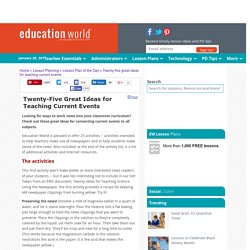

Union Suffers Big Loss at Tennessee VW Plant. Directions If possible, print the article before reading.

As you read, circle or underline the names of people, organizations and important facts. Use your own words to answer the questions in complete sentences. (by Neal E. Boudette, The Wall Street Journal) - The United Auto Workers union [UAW] suffered a crushing defeat Friday, falling short in an election in which it seemed to have a clear path to organizing workers at Volkswagen’s plant in Chattanooga, Tenn.
Summer%20academy%20CWP%20Syllabus. Cwp_syllabus_2011-2012.docx. Classroom Deliberations. Current World Issues Project - Mr. Flindt's World History Class. Mrs. Atwood's Wiki / Introduction. Introduction to Global Issues Assignment: Please watch the following video created Carl Fisch, an employee of the Littleton Public School District in Colorado.

After watching the video, reply to the post. Post here: -I think, the world is not getting smaller, the POPULATION is getting bigger. -Irina -Brian C ---Obviously, the world isn’t literally getting smaller, however in the since that our technologies and population are growing, the world is beginning to look smaller and smaller. Resources and soon enough this world isn’t going to provide for us. This video states many good points as well as exaggerating somewhat as well. Fyi.com. Current Events. Students Not Visiting the Newseum.
Students Not Visiting the Newseum The Newseum offers lesson plans for teachers in three main areas: Headlines of History, Journalism and the First Amendment.

Click the links below to download the corresponding lesson plan. Elementary & Middle School Lesson PlansJournalismNews Confusion: What is News? Students play a sorting game to figure out what types of stories and events are "news. " They learn about the Newseum's 10 "what is news? " Are You A Publisher? Today's Front Pages (Teacher Note: This lesson is for grades 6–12.)Using the Newseum’s online Today's Front Pages collection, students can compare and analyze coverage of and attitudes toward national news, local news, weather, politics and culture. Related online resources: Back to School: Study a Current Event #30DaysofGOOD - GOOD Projects. 30 Days of GOOD (#30DaysofGOOD) is our monthly attempt to live better.

This month we're going "Back to School" and committing to learn something new every day. These days, we have more options for getting information quickly than at any time in history. But vaster, faster access to news doesn't guarantee that we really know or truly understand what's happening in the world. Take, for example, the results of a recent research project reported on by the Poynter Institute: People who watch no news at all can answer more questions about international current events than people who watch cable news, a survey by Fairleigh Dickinson University’s PublicMind finds. While part of the problem lies with the choices we make about where we get our news from, there's also the issue of information deluge. Twenty-Five Great Ideas for Teaching Current Events. Looking for ways to work news into your classroom curriculum?

Check out these great ideas for connecting current events to all subjects. Education World is pleased to offer 25 activities -- activities intended to help teachers make use of newspapers and to help students make sense of the news. Also included, at the end of the activity list, is a list of additional activities and Internet resources. This first activity won't make better or more interested news readers of your students -- but it was too interesting not to include in our list!
Taken from an ERIC document, Twenty Ideas for Teaching Science Using the Newspaper, the first activity provides a recipe for keeping old newspaper clippings from turning yellow. My Forms. Instructor: Matt Mays “That government is best which governs the least, because its people discipline themselves.”

-Thomas Jefferson “Government is not reason, it is not eloquence, it is force; like fire, a troublesome servant and a fearful master. Never for a moment should it be left to irresponsible action.” -George Washington “The essence of Government is power; and power, lodged as it must be in human hands, will ever be liable to abuse.”
“Let us never forget that government is ourselves and not an alien power over us. CURRENT ISSUES. Television News Archive. Newspapers In Education - The Seattle Times. Welcome to The Seattle Times Newspapers In Education (NIE) program.

NIE provides community sponsored electronic newspapers, learning programs and online activities to educational organizations throughout Washington state and beyond to help foster literacy and real world learning. Learn about the programs we have to offer and register today by e-mailing NIE at nie@seattletimes.com or calling 206/652-6290. Curriculum Guides Our library of curriculum guides, written by professional educators and writers across the country, addresses the most current issues in education through the use of the newspaper.
Visits/Teacher Training The NIE Outreach Specialist is available to come to your school to run an activity using the newspaper or conduct training with your staff. Service Issues Service is important to us. Workshops Learn how to use the paper in your classroom with discussions and hands-on activities. NewsHour Extra. News. Student News. The Learning Network - The Learning Network Blog - NYTimes.com.